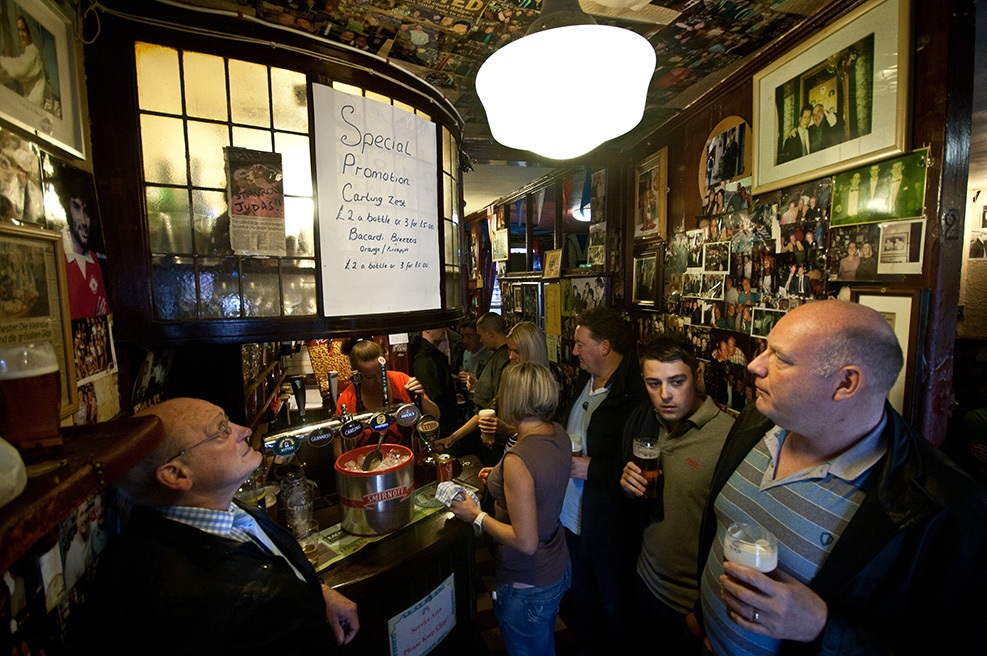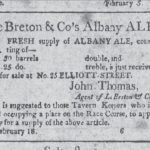
December. The month that is three weeks long followed by two weeks of blur before real winter sets in. Winding up the year’s work is the main thing on my plate. From 2006 to 2015 this would have been the culmination of the annual Yuletide Kwanzaa, Hogmanay, Christmas and Hanukkah photo contest but I have long come to my senses. You can see the annual winners here. That is the 2012 Champion up there by Robert Gale of Wales. As I wrote then, click on the photo so you can see the full scale and explore all the detail for yourself. Robert explained in his email where the photo was taken:
Located in Manchester, England, the Circus Tavern apparently has the smallest bar in Europe. It’s also located in the hallway of the pub near the entrance which means it very easily gets crowded.
Well, did anything happen this week in beerland? OK, fine: the big news in craft was not just a buyout this week but that a minnow was seemingly swallowing a whale. The billion dollar baby that is Ballast Point was sold seemingly to a mere brewpub. It is not quite what it appears as the purchase was made with a bucket of moolah earned from a sale four years ago in the hospitality industry along with input from other friendly and wealthy investors. Within minutes of the announcement, Josh Noel on the scene in Chicago noted the reasons why the sale was made from the view of Constellation brands:
… on maximizing growth for our high-performing import portfolio and upcoming new product introductions, including Corona Hard Seltzer, scheduled to launch this spring.” That’s right. It all comes back to hard seltzer.
Excellent. Hard seltzer. The future is now. Anyway, Noel’s story in Wednesday’s edition of the Chicago Tribune will be your best starting point for the background. Me, I suspect that (even if not Plan A but at the fallback Plan C level of the original Ballast Point purchase) there was the opportunity for significant tax write offs down the road.
Elsewhere, I declared that one particular story was one of the best bits of beer writing I’ve read this year and I meant it. Just look at this:
The ditching of big-brand lagers was similarly controversial and Ashley’s attitude reveals the gulf between traditional attitudes and those of the modernisers. There is still lager on offer but it’s from Moor and Lost & Grounded. Though you might think these would appeal to Bristolian drinkers, there’s a weird loyalty to international brands brewed under licence, and these sometimes hazy, fruity, characterful beers bear little practical resemblance to Foster’s or Stella, despite the shared family tree.
An actual investigative research and writing piece from Boak and Bailey that takes a very immediate specific example of the life of a pub in our times and makes it a universal question cut with a strong note of sympathy: “it’s drinkers who prefer a more traditional, unpretentious atmosphere who have to schlep or catch the bus.” Fabulous.
Others have commented but I was – perhaps oddly – reminded of this when I read Matt Curtis and his reasoned argument for more UK breweries joining SIBA to promote independence. While he is correcting in stating this:
This still means that at least 86% of beer sold within the UK is produced by the multinationals. As such I am eager to see the next step in the discussion of independence, and some real progress in terms of presenting this argument to a greater number of industry members and bringing them together to form a unified front against increasingly tough competition and unfair access to established routes to market…
I am mindful of the beer drinker of modest means seeking their refuge from craft. Is that not as much a cry for independence? For autonomy from the gaping maw of gentrification into which craft beer is poured?
Bad Guinness pours. All day. All bad.
I am never sure of anything that is based on the concept of “wine drinkers” and “beer drinkers” as being subsets of the population but I found this bit of discussion from Danielle Bekker of Good Living Brewing failure interesting. She asks whether it wouldn’t be better to describe beer according to flavour profiles as opposed to more familiar methods. Being a hearty believer in the uselessness of style as a construct I like the idea but then hit a wall with the notion of a beer that “will appeal to wine drinkers as well as women.”
Sadly and as reported on this week’s edition of the OCBG, Waterloo Brewing Ltd. from Ontario says it has lost $2.1 million to a cyber scam:
The Ontario brewery says the incident occurred in early November and involved the impersonation of a creditor employee and fraudulent wire transfer requests. Waterloo Brewing says it initiated an analysis of all other transaction activity across all of its bank accounts, as well as a review of its internal systems and controls that included its computer networks, after becoming aware of the incident this week.
Martyn made a confession…
I know there are beer writers who eschew any involvement with corporate freebies, but my argument has always been that I’m very happy to accept free stuff, from beer to trips abroad, when it enables me to put information in front of my readers that I would not be otherwise able to give them. Certainly I do not believe I have ever held the boot back because someone had dropped off a case of beer.
At the risk of someone searching the blog’s archives, I don’t think this is ever the key points. My concerns are always two-fold: (i) you are telling the story that the brewery provides for you, even if you do put the boot in and (ii) you are not telling the story of the brewery which does not pay for the trip. So they all go to Asheville and then they all go to Carlsberg. Bo. Ring. There is a third point. You do not go to these junkets alone. Even if “it enables me to put information in front of my readers that I would not be otherwise able to give them,” well, the same information will be put in front of same readers by the other members of the same traveling hoard sent the airplane tickets, the hotel room reservations and the buffet passes. There is no special story attached to a junket. Go find a unique story instead.
 Two items from the co-authors. First, Craig has been digging more and found two very early advertisements for Albany Ale in the Charleston Daily Courier of 1808. Which not only means triple was being brewed in 1808 but it was being shipped to Charleston. Which is cool. I have seen “treble” spruce beer in New York City in 1784 but never a pale ale at that weight with that name.
Two items from the co-authors. First, Craig has been digging more and found two very early advertisements for Albany Ale in the Charleston Daily Courier of 1808. Which not only means triple was being brewed in 1808 but it was being shipped to Charleston. Which is cool. I have seen “treble” spruce beer in New York City in 1784 but never a pale ale at that weight with that name.
 Second, Max. Max was the centerfold cheesecake pin up in a Czech newspaper this week. A very hairy centerfold. Wonderful.
Second, Max. Max was the centerfold cheesecake pin up in a Czech newspaper this week. A very hairy centerfold. Wonderful.
The DC Beer 2019 year in review post is up.
That is it. I am on a train as you read this over your morning coffee. I’ll be back tomorrow. In the meantime, there’s more news at Boak and Bailey’s on Saturday, at the OCBG Podcast on Tuesdays and sometimes a mid-week post of notes from The Fizz as well. And look for Katie’s weekly newsletter, too.

Complaining that beer writers are all covering the same events is like complaining that political writers are all covering Brexit, or Trump, instead of finding exclusive topics to write about. And as it happens, of the past 20 Zythophile blogposts, 65 per cent have been complete exclusives. But sometimes one has to give one’s own take on what it happening, and sometimes that is best facilitated by accepting hospitality. I don’t really care if people disagree with that as a stance: my conscience is entirely clear.
That’s exactly what it isn’t. Junkets are not newsworthy. They are PR constructs. And I’m not complaining, just objectively observing. I have no quibble with your writing – as you quite correctly note, you write many original pieces. Do others? Not so much. Is your junket work yor best? Not so much. No one’s is.
Mmmm, but on the other hand a junket to, eg, Catalonia, enables me to learn important facts about both the local and the wider European beer worlds, eg the fascinating links between the Catalan gastronomic scene, one of the most dynamic in the world, and its craft beer movement, that informs my writing on the subject and makes me a more knowledgeable and therefore a better beer writer; and as the quid pro quo I get to promote Catalan craft beer to a wider audience, so that other people get to enjoy it, and both they and the brewers benefit.
You need to remember, however, that no one cares about Catalan beer. A PR campaign like that is a dead end. Ten years ago I had just completed helping building two sports and rec centres worth about $70,000,000. I likely will never build one again. Did I learn plenty and enjoy the challenge? Sure. Became a better lawyer? Probably. Could I have learned the same lessons on smaller projects with more repeat potential? Certainly. Bridges. Moved from repairs under seven figures to $5,000,000 bridge refits to now a $35,000,000 new one and a massive $180,000,000 one. Bridges are all around us. You didn’t need to go to Catalonia with others to learn about food and drink and there is no massive move towards demanding more Catalonian things in our daily lives but I’m sure it was pleasant to experience it all. I’d appreciate your writing as much or more if the new scene or topic you had explored instead of going on that junket was in the UK.